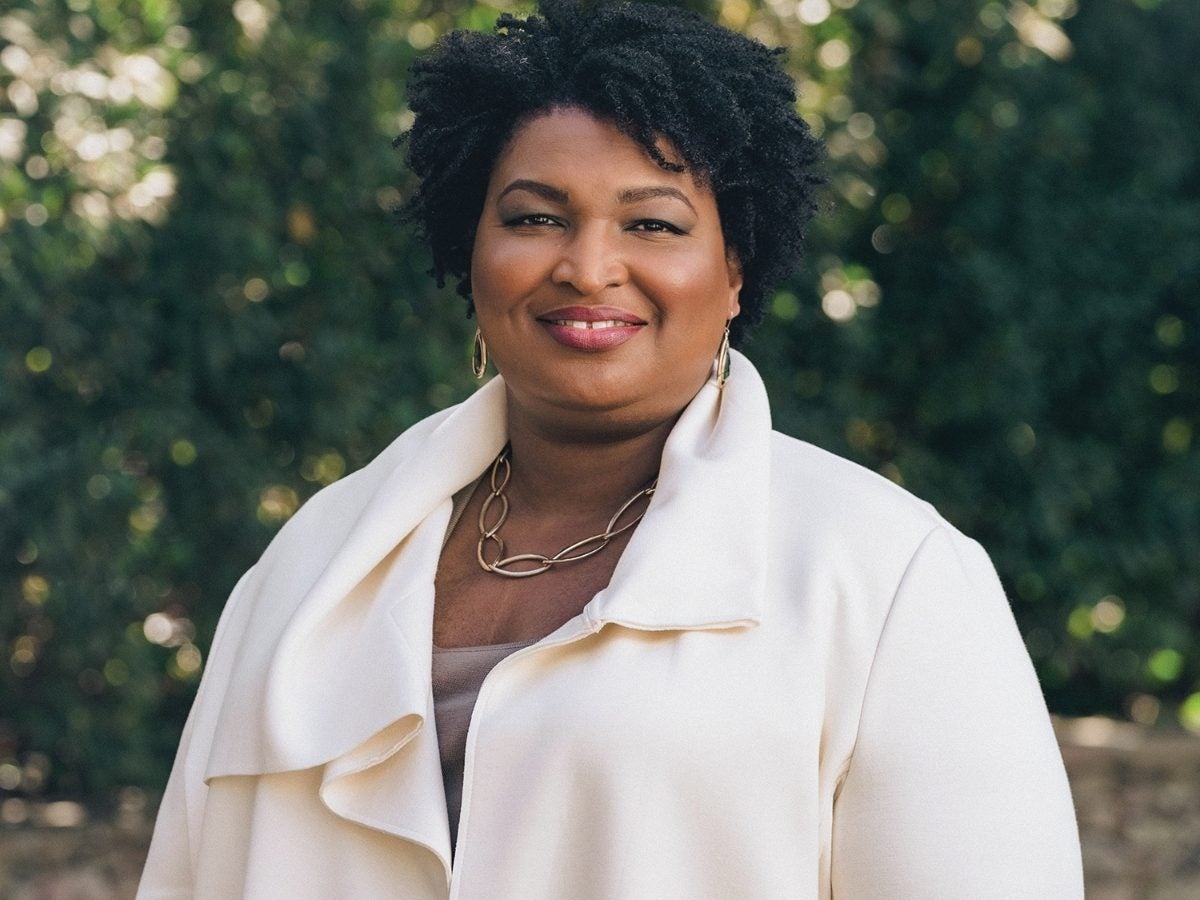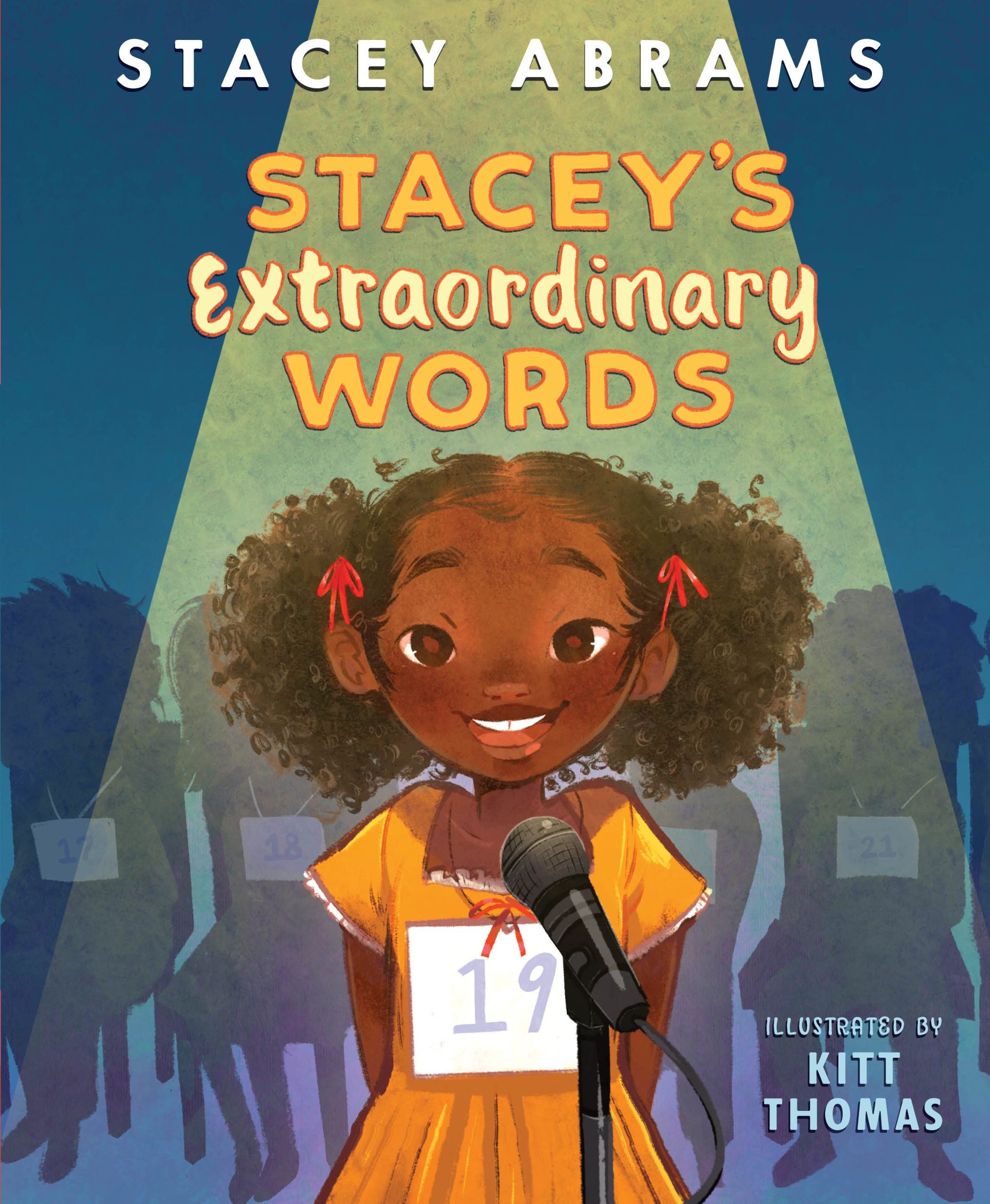
The day I interviewed Stacey Abrams, she later announced that she would be running for governor of Georgia, a position she narrowly lost to Brian Kemp in 2018. Never one to quit, Abrams’ story is one of staunch perseverance. After her loss, she founded the Fair Fight Action voting rights organization, and Abrams lead the effort to flip Georgia blue in the 2020 election.
Abrams is now sharing her life lessons of determination with children and adults in her first children’s book, Stacey’s Extraordinary Words, arriving on bookshelves on December 28th. The voting rights activist, New York Times bestselling author, and former Georgia House Minority Leader has penned a book based on her own childhood experience of participating in spelling bees during elementary school.
In the book, Stacey has to go up against Jake, a student who is known for teasing and antagonizing his classmates. The plot follows young Stacey as she studies for the spelling bee, feeling both intimidated by her competition and excited for the big day. And while the outcome of the spelling bee is not what Stacey anticipates, the experience leads the character to reflect on what is won through losing. With gentle prose and rich illustrations, Stacey’s Extraordinary Words shows readers that failure can lead to growth and a chance to try again.
I sat down with Abrams to talk about what it was like growing up surrounded by books, what keeps her grounded after loss, and despite everything, what keeps her hopeful.
After writing romance novels, a political thriller, and several books about your political activism, tell us what led you to write a children’s book?
STACEY ABRAMS – I love writing and I think it’s important to tell good stories that help people see the world more broadly. Genre for me is using different muscles and experimenting with new ways to tell stories. And I love children’s books. My mom’s a college research librarian, but she also had a specialty in children’s literature so I grew up not only reading but really deeply appreciating how thoughtful and fun and complex children’s literature could be.

How else did having a mom who was a librarian shape your identity growing up?
ABRAMS – I literally used to take naps in the stack. When I say I grew up surrounded by books, it is both literal and emotional. My younger sister is a year younger than me, and when we were growing up, we went to daycare on the campus where my mom was a librarian. When we finished, we would have to leave daycare so we would sleep in the [book] stacks.
I grew up surrounded by the smell of books, and they were omnipresent in our house. We didn’t have a lot of money, but we had a surfeit of books. It was ultimately my parents who deeply encouraged reading – my mom because this is what she did for a living and she would read to us. My father was dyslexic and undiagnosed until he was 30. He was semi-illiterate, but still appreciated and longed for the ability to lose himself in a book. He was just an amazing storyteller. And so from both of them, there was an appreciation of books from very different vantage points, but true and real and visceral, nonetheless.
Stacey’s Extraordinary Words is based on your childhood experiences, and in the book, Stacy is recognized for her talent by a teacher who sets her on a path towards success. I’m wondering if you’re in contact with that teacher, Mrs. Blakeslee, who recognized your talent. What would you tell her today?
ABRAMS – It’s been 40 years, and no I’ve not seen Mrs. Blakeslee since elementary school, but I would tell her thank you. I appreciate so much how kind she was to me. [In elementary school] I’d been promoted and skipped a grade, and when you’re six you don’t really understand what that means. All I knew is that I was being moved from a class that was somewhat familiar to a class that was completely unfamiliar around kids I didn’t know.
I wasn’t shy, but I was quiet. I didn’t want to make a mistake, and she recognized early on how much I loved reading. One thing I was allowed to do when I finished my work in class was pick out any book I wanted to read. I started reading when I was very young, and her willingness to let me have that as a respite as I got acclimated is something that has stuck with me, and I would tell her a deep and abiding thank you.
In the book, when Stacey doesn’t get the outcome she wants in the spelling bee, you wrote, “If today were like one of the stories Stacey loved most, she would have won…But things didn’t always happen that way in real life. Sometimes change was harder. And it didn’t happen right away.” To me, this is such a powerful message about being patient with change. Why is it so important for our children to know this lesson?
ABRAMS – I have a lot of recent public experience wanting something badly, working hard at it, and not getting it. And one of the reasons I think I’ve been effective at navigating that is that I started learning this lesson young. When I was in that spelling bee, it wasn’t Jake, but Jake is a bit of a composite character. But there are these things that you want and you think if you do all of the things right, that it will turn out that way because you read about it in books.
And I think it’s important for children’s books to let us know it doesn’t quite work out that way. But that doesn’t diminish the importance of studying. It doesn’t diminish the love of the word, and it doesn’t mean that you shouldn’t try for the things you want, or that you shouldn’t defend the people around you. It just means that you might have to do it again. And again. There is victory in your persistence.
When you experience the kind of setback you mentioned before, what grounds you?
ABRAMS – My family. I have five brothers and sisters and we’re all very close. There’s 12 years between the oldest and the youngest, and our parents are the most extraordinary people I’ve ever known. And it’s not just in the moments when things happen, it’s the lessons and the love and the support that stays with you from moment to moment. So even if I can’t reach them in the moment of tragedy or triumph, I know they’re there with me. And I know when I need them they’ll be there.
That’s beautiful that you have that support system. I think for a lot of people, the state of the world seems pretty bleak these days. What gives you hope right now?
ABRAMS – My nieces and nephews. They range in age from five to 16, and they each have a unique and insightful perspective on the world. None of them believe things are dire. They remind me why the work is important and why it’s inevitable that we will get good done. It won’t stay that way and bad will come back, but they are the reminder that it’s been done before and it can be done again.
What’s one thing you want people to take from this children’s book?
Victory doesn’t always look the way we’ve been taught to expect it. [Stacey] may not have won the spelling bee, but she won confidence. She won insight and she became a better person that day.